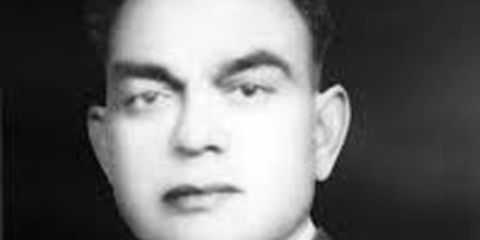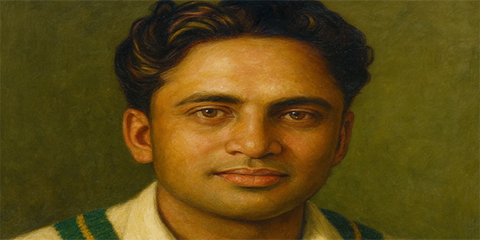From groundsman's son to Test star: The incredible journey of Pakistan's oldest debutant
JournalismPakistan.com | Published 4 months ago | Dr. Nauman Niaz (TI)
Join our WhatsApp channel
ISLAMABAD—Born in the spring of 1907, when the subcontinent was still tethered to the empire, he came of age under the slow arc of colonial light. By the light of the Pindi sun, under the long shadows of the Raj
There are lives that pass through history not with fanfare, but with the hush of monsoon wind before it breaks — soft, steady, and unrelenting. Malik Miran Bakhsh was one such life. It was not a name shouted in press boxes thick with cigarette smoke, nor one that danced off the tongues of port city poets over chai and radio crackle. But once, brief, blistering, and barely believable, he spun himself into the early landscape of Pakistan's cricketing story.
Roots in Rawalpindi: From Groundsman's Son to Cricket's Margins
Born in Rawalpindi in 1907, when the map still had the British lion's impact, and Pakistan existed only as a question enigmatically envisioned behind closed doors, Miran Bakhsh came into a world that did not promise greatness to men like him. His father was a groundsman at the Pindi Club Ground, a servant of cricket in the most literal sense — mowing lawns the sahibs played on, chalking lines none of them would ever cross.
And so, the game came to Malik not by way of coaching manuals or boarding school afternoons. It came from the damp breath of the earth. From the clatter of boots and ball on colonial turf. From the rolled pitch where his father bent his back for an empire's pleasure. He did not inherit cricket. He absorbed it — like sunlight through skin, like a call to prayer echoing across rooftops before dawn.
The Late Bloomer: First-Class Cricket at 43
By the time he stepped onto a first-class field, it was 1950. He was 43. For most, that's an epilogue. For Malik, it was a quiet overture. By then, the country was barely three years old — its borders raw, its identity uncertain, its cricketing ambition almost laughable in the eyes of those who thought only the colonizer could define elegance.
But there had been talk, of course. In 1948, the West Indians came to Pindi, all calypso grace and Caribbean swagger — and some claimed that Miran turned them inside out under the unforgiving sun. No scorecards survived. Only the memories of those who saw it, who later swore that he didn't bowl balls — he bent time.
The Commonwealth XI came. He spun again. Still no headlines. Just the rustle of awe in the Pindi air. He was a spinner of silence, a conjurer in anonymity.
The Historic Test Debut: 1955 Lahore
Then came Lahore, 1955. India is in town. A subcontinent still bleeding from division, borders warm with memory. Malik Miran Bakhsh — 47 years and 284 days old — was handed a Test cap. No grand narrative. No rising-from-the-ashes arc. Just a wiry man with a village soul and hands stained with earth, standing before his neighbors across a line that hadn't existed when he was born. It was only his second first-class match.
He stood tall at the bowler's mark, ramrod straight like the old railway signals of Rawalpindi Cantonment. His bowling lacked polish, but not purpose. It felt ancient, like a script read from a forgotten tongue. His fingers released the ball not with aggression, but with authority, like a farmer casting seed into a field he knew would bear fruit.
Two Tests, Timeless Legacy
Two Tests. That's all he played. The ledgers of history barely blinked. But the numbers, as they often do, betrayed the soul of the thing. They don't tell of the way he challenged men half his age, some young enough to call him uncle, others perhaps reminded of their elders watching from verandas in Amritsar or Multan. They don't tell of the country — fragile and furious — that sent an almost 50-year-old man into a cricket war because it had no other generals. They don't tell of the pride of a people who saw themselves, finally, not just surviving a game, but commanding it, even if only briefly. He played on. Until 1959. Until time, that other great spinner, finally raised its crooked finger.
In Dacca, now Dhaka, at 51 years old, Malik turned back the clock one last time — 6 wickets for 15 runs. No glory. No pressmen scrambling for quotes. Just a slow, sacred unraveling of batsmen who didn't know they were playing against history.
That spell, like most of his life, vanished into whispers. A final sleight of hand. A last gift to the game that barely knew him. Or perhaps chose to forget him.
The Domestic Journey: Crafting Magic from the Margins
In the dry shimmer of Rawalpindi's sun, on a dusty ground where children bowled dreams more often than balls, Miran Bakhsh began—unknown, unnoticed, yet undeterred. A man of his soil, forged not in manicured academies but on cracked turf and the rhythms of club matches, he laboured beneath skies streaked with dust and aspiration.
The years rolled forward like old leather balls through parched grass, and Miran, always a step ahead of time and yet somehow behind its cruel pace, found his way into the fabric of domestic cricket. It wasn't fireworks or fanfare, but a quiet flame that began to glow around the turn of the 1950s.
By then, he was no longer young, but his arm still coiled like rope and unwound spells as though they were spun in some ancient workshop of craft and guile.
The Numbers Behind the Mystique
In fifteen first-class matches, he basted together a modest but strangely moving tapestry—48 wickets at 19.43, three five-fors, and one near-mystical performance: 6 for 15, with the ball caressing the bat like a ghost in twilight. He bowled not just to dismiss, but to deceive, to charm, to test the heartbeat of a batsman's soul. And though the annals of record books have little to say about his feats, those who saw the ball leap from his hand will tell you of its intent.
Conquering Giants: West Indies and Commonwealth XI
He wasn't young when the world began to notice. At 42, while most men retired to memory, Miran stepped into first-class cricket. He had waited—not in bitterness, but in faith. Against West Indies, he produced a spell now wrapped in sepia—a five-wicket haul that took down giants like Headley, Walcott, and Goddard.
The Commonwealth XI, who had no reason to fear him, learned otherwise in Rawalpindi: twice in two days he took five, 5-19 and 5-63, as though the years between 20 and 40 had simply dissolved.
Test Cricket's Second-Oldest Debutant
Then came 1955. India crossed the border for the first time, and in Lahore, a man aged 47, skin worn by sun and resolve, was handed a Test cap. Miran Bakhsh, creaking into his run-up like a tale from a lost era, dismissed Punjabi and Manjrekar—both clean bowled, both undone by the flight, not the pace. He bowled 48 overs in that match, sweat mixing with history. In the next Test, he toiled without reward. And just as suddenly as he had arrived, he was gone—no farewell, no festooned goodbye. A man for one moment. A memory.
The Twilight Years: Playing Until the End
But he wasn't done. Even as his bones grew older, he kept bowling—59 overs in a spell against the New Zealanders, more than most men half his age. For East Pakistan Greens and Whites, for Punjab B and Northern Muslims, he played like a man haunted less by age than by the fear of silence. At 50, he was still conjuring five-wicket hauls; at 51, still leading with ball in hand. His final act came against Peshawar: 3 for 19, 1 for 26. A quiet exit, as all things with him were.
Return to Rawalpindi: The Teacher's Final Chapter
Miran Bakhsh never became a household name. But in the lonely corners of Pakistan cricket's early pages, his name flickers like an oil lamp. After his last over was bowled, he returned home—not to recline, but to teach. On the same grounds where he began, he became a whisperer to the young, a patient custodian of spin.
He died in 1991, in Dhok Ratta, Rawalpindi, the city that had always been his womb and witness. Eighty-three years of life, most of it passed in cricket's shadows. But those shadows, at least for one Miran Bakhsh, were sacred ground.
A Spinner of Freedom
Because Malik Miran Bakhsh didn't belong to the world of sponsored kits and evening replays. He belonged to Rawalpindi before the maps were redrawn. To the scent of camphor in cricket bags and the cracked leather of village boots. He was a spinner of freedom — not the kind draped in flags and slogans, but the kind that unfolds, wordless, when a man from the margins takes center stage and refuses to blink. There are no statues for Malik. No streets in his name. Only a memory — passed like heirloom — of a man who bowled not for applause, but for a country still learning to dream.
The Quiet Farewell
There was no farewell. No send-off. No fading applause beneath an amber sun. No testimonial match staged in slow-motion sentiment. Just a gentle, almost imperceptible fade — the kind known best to those who had always lived in the margins, who never demanded the centre of the frame. He had always belonged to the background — to the whispers between overs, to the pauses between innings.
When he perished, Pakistan had climbed its Everest. Pakistan had conquered the world at the MCG, the green shirts wrapped in glory, the streets erupting in a crescendo that shook the old colonial bones of the nation. The world had taken notice. The country, finally, was no longer playing catch-up.
But far from the cameras, the Pindi Club Ground had grown tired. Its walls remembered more than they let on. And somewhere, quietly, the man who had once bowled there before Pakistan had a flag — and long after it hoisted one — slipped into the shadows, unheralded.
The Eternal Spinner: A Legacy Beyond Statistics
He was the second-oldest debutant in the history of Test cricket. But that's not the right sentence to define him. Miran Bakhsh wasn't a man of his time. He didn't arrive with a cohort. He belonged to no generation, no movement, no wave. He belonged to moments. To glances of light between branches, to the hush before the crowd fills in, to the feel of stitched leather in a calloused palm. And like those quiet freedom fighters who never signed treaties, who never stood at podiums, but who lit torches in corners of courtyards and passed them hand to hand — Miran Bakhsh lived not for acclaim, but for presence.
He spun not just for wickets, but for something deeper. For the right to say: I was there when we were young. I spun dreams before the world even knew our name.
His was a story the scorecards cannot hold. Two Test matches. Two wickets. A life folded between pages that never got turned. But in the deeper places of this land — in the dust that rises from backstreet games, in the silent nods of old men watching new bowlers — he endures. Because some players are remembered. Others are felt.
Miran Bakhsh was never meant to be the hero. He was meant to be the proof. That greatness doesn't always roar. Sometimes, it spins — slow, deliberate, and eternal — from the fingers of a man long forgotten. But never truly gone.
Dr. Nauman Niaz is a civil award winner (Tamagha-i-Imtiaz) in Sports Broadcasting & Journalism, and is the sports editor at JournalismPakistan.com. He is a regular cricket correspondent, having covered 54 tours and three ICC World Cups, and having written over 3500 articles. He has authored 15 books and is the official historian of Pakistan Cricket (Fluctuating Fortunes IV Volumes - 2005). His signature show Game On Hai has been the highest on ratings and acclaim.

























